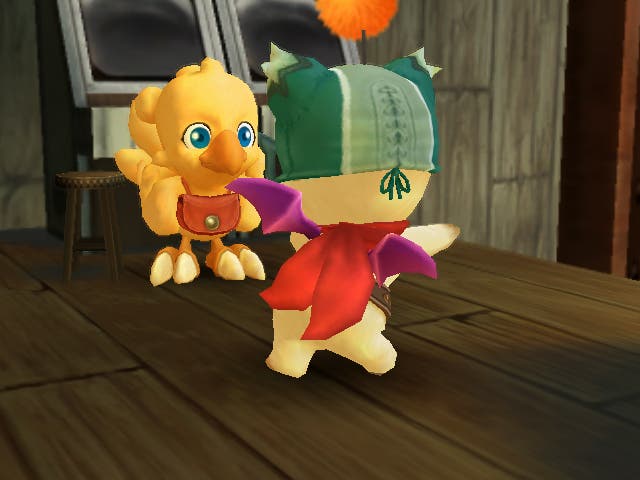Final Fantasy Fables: Chocobo's Dungeon
Chick-like.
Roguelikes are not games for children. The randomly-generated dungeon-crawler, first conceived when videogames were written in DOS, displayed in ASCII and measured in bytes, is one of gaming's most cranky and unforgiving propositions. Chances are you'll start off all bright-eyed and confident, sword in hand and satchel stuffed with potions and hope. But fifty floors later, when you've exhausted all of your supplies to make it to the final boss, only to be punched in the neck by a fat goblin and unceremoniously kicked back to town, losing all of your items and money en route, you're going to need some epic swears that are beyond the range of those of school age.
Roguelikes are not games for children. So dressing one up in bright, primary colours and making the protagonist a doe-eyed, kweh-ing custard-yellow chicken is a bit like asking Stephen Hawking to lecture a children's party on theoretical physics while dressed as Bugs Bunny: one way or another, kids are going to end up in tears.
It's not the first time Square-Enix has sent their cutesy mascot into a Dante-esque hellhole. This is, in fact, the third Roguelike Chocobo has starred in, the first two games released for the first PlayStation (only one of which made it to America and none of which came to Europe). This title follows the template and tone of the previous games, an unexpected resurrection for Square-Enix that, despite its mismatching of childish presentation with sadistic mechanics, provides a solid and engaging experience.

The story is told in full, florid Final Fantasy vernacular. You play as Chocobo, sidekick to the explorer Cid, and through the adventure you'll meet white mages, moogles, Ifrit and Leviathan all the while Uemtasu's arpeggio melodies play out on delicate music boxes. In contrast to the main series most of Chocobo's Dungeon takes place in one central location, the town of Lostime. Its inhabitants are losing their memories, more slipping away each day with the toll of the town's bell. Far from being concerned about the creeping amnesia, the townspeople embrace it, believing that their quality of life increases in step with their forgetfulness.
Your mission is to prove them wrong by literally entering the dungeons of their minds, travelling to the deepest floor and recovering their un-treasured memories. In mechanical terms this translates to a series of increasingly difficult, randomly generated dungeons (one per town's citizen plus a host of optional extras). Complete a dungeon and you recover a memory; collect all of the memories and the town's individual and collective identity will be restored. It's a strong conceit and one that proves more compelling than the usual quest to save the world. The tight geography might reduce the breadth of the game, but it helps to focus the player's mind on its depth. And Roguelikes are all about the depth.
While Chocobo's free to explore the town as in a standard RPG, almost all of the game's true content is focused in the esoteric underground chambers of its inhabitant's minds. Each floor of these dungeons is constructed by the game on-the-fly. The aim is to find the staircase to the next level as quickly as possible, avoiding traps, picking up items and defeating any enemies that stand in your way.


